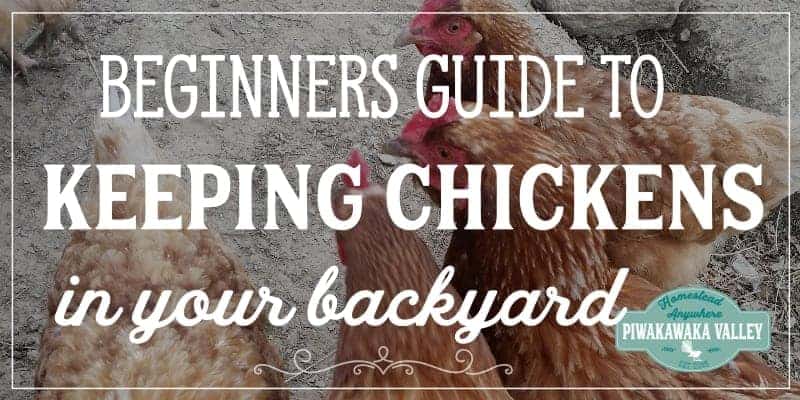How to Break a Broody Hen
If you have kept chickens for any amount of time, you have probably come across a broody hen. Some broody hens are very persistent and refuse to go un-broody for quite some time. If you have a broody hen you might be wondering how to break a broody hen and get her back to laying!
What is a broody hen
In Spring and Autumn/Fall (and sometimes in the Summer as well) some chickens get the call of nature to be a mama.
Please read: This information is provided for educational purposes only and is not intended to treat, diagnose or prevent any disease. We encourage you to make your own health care decisions in partnership with a qualified health care professional.
This post contains affiliate links, this means at no extra cost to you, we make a commission from sales. Please read
our Disclosure Statement
A broody hen is one that is choosing to sit on her nest and incubate her eggs. A broody hen will sit through anything that you throw at her, she will miss out on food and water and defend her nest with mighty bites.
It can be difficult to the untrained eye to know the difference between a broody hen and one that is just sitting in the nesting box waiting for her daily egg to arrive.
The way to tell a broody hen from a sitting hen is how she behaves. If you interrupt a chicken about to lay an egg she will usually leave the nest, or at least stand up while you collect the eggs from under her.
A broody hen on the other hand will puff up, spreading her feathers and turning to face you. She will make a distinct warning sound – a long drawn out brrrrrruuuuuuuuuuk and will likely peck you if you go in to get the eggs.
She will sit, day in and day out only leaving the nest once or twice a day to poop and quickly grab a snack and a drink, all the while being puffed up and warning the other chickens that she is on a mission with a slightly shorter but just as distinct sound.
RELATED: How to hatch eggs without an incubator
RELATED: How to build a DIY incubator
Why you would want to break a broody hen
If you do not have fertile eggs, then a broody hen is just a bit of a nuisance. If a hen is broody and sitting on a nest then she is not laying eggs.
Presumably if you have chickens you are probably hoping to get eggs from them so a non laying broody hen is not being helpful.
Broody hens also can be quite difficult to manage in a coop with other birds, especially with limited nesting boxes.
A chicken that is sitting on a nest will not be eating well or looking after herself the way they usually would and they can lose quite a lot of condition if they are insisting that they need to be sitting on a nest even if it is empty.
Usually a chicken will sit on fertile eggs for 3 weeks then she will go back to eating and drinking like she should when they hatch. But without the eggs hatching, a broody hen can sit for many weeks longer and make herself quite weak, so if you are not planning on letting her sit on eggs, then breaking her brood is the kindest thing that you can do.
RELATED: What is best? Hen or incubator?
How to break a broody hen the quick way
When a hen is broody, she experiences a hormone change (much like pregnant women) that increases her body temperature slightly and makes her want to snuggle and nest. It slows down her digestion to ensure she is getting as much out of her food as possible and reduces the number of times a day that she needs to leave the nest to poop.
The fastest way to break a broody hen is to put her somewhere that she cannot brood and that helps lower her temperature again.
We have found the best option is a dog crate. Some people say that the cage has to have a wire floor and to hang it somewhere cool and drafty, however I have not found I needed to do either of those things.
We set up a large dog crate somewhere inside that bright and light with no walls or covers close around it. We add 2 perches low down and no places to snuggle or nest. She (or sometimes multiple she’s) get food and fresh water and that is it.
Some chickens will break their brood in 1-2 days, others will take longer. I like to see them perching to sleep and you know that their brood is broken if they start laying eggs again.
The faster that you recognize a broody hen and the faster you move to break the brood, the easier it will be.
A very persistent broody may need to go in a wire based cage that is up off the floor – it doesn’t need to be hung high, just off the ground so that there is not a chance of her getting snuggly and comfortable anywhere.
What are the other options if my hen is broody and I don’t want to waste it or break her?
There are a few options that you can do if you don’t want to break your hens brood or if you want to let nature take its course.
In the wild/nature a hen will make a nest hidden away from everywhere in a dark, sheltered, safe place and she will lay her eggs in there for 7-15 days. Then she will retreat from the flock and sit on her eggs for 3 weeks until they hatch. Then she will slowly bring the chicks to join the flock.
If you have been collecting her eggs every day, then she won’t have a stash to sit on, but that won’t deter a broody hen’s instincts. She will sit on an empty nest, she will sit on everyone else’s eggs, she will do whatever it takes.
Give fertile eggs
If you have a rooster with your flock, you can simply give your hen some of her (or someone else’s) eggs back. You do need a rooster for the eggs to be fertile, and you cannot hatch shop bought eggs.
If you don’t have a rooster with your hens, you can ask around and see if you can get some fertile eggs locally. Another option is that you buy some online and get them shipped to you. This can be expensive, so you will want to be sure that this broody behavior is sticking and isn’t just a whim for a day or two. Usually a hen that has been sitting for 3 days is in it for the long haul, so I don’t recommend giving eggs to a hen in the first couple of days of her brood in case she decides it is not for her and she hops off the nest.
If you are waiting for eggs to be delivered you can give her dummy eggs like these, real eggs that you can discard later or even golf balls will do in a pinch. This will help keep her on the nest.
RELATED: Benefits and down sides to keeping a rooster
RELATED: The ultimate guide to what can chickens eat and not eat
Give baby chicks
A broody hen will usually accept day old chicks that are snuck underneath her.
This is best done with hens that have proven themselves to be good mamas previously, and some breeds are better at it than others. Bantams, especially silkies are almost always great mothers, whereas the commercial egg laying hybrids are less likely to become broody in the first place and not as likely to be a great mother.
In saying that, our best mother hen was a hybrid layer!
For best results sneak the day old (or two days old at most) baby chicks under the mama at night. Remove all dummy eggs from the nest at the same time. Keep the mama and the babies contained for a few days while they bond and then slowly let them out to range further.
Let nature take its course
If you don’t have the space or the set up for a crate for breaking broody hens, don’t have fertile eggs and don’t want baby chicks you can go the low-intervention approach.
This is simply every time you see her sitting on the nest, remove her and put her out with the other chickens. Locking her out of the nest boxes over night can also help and be sure to clear the nesting boxes of eggs at least twice a day.
Usually with this treatment, the brood will pass in a few days to a week and then she will get on with life.
It is not recommended that you leave a broody hen for weeks on end brooding as she will begin to lose significant weight and can become quite weak and unwell.
If you have a broody hen, there are many options to breaking or embracing her broody behaviour. It is up to you to decide what would work for you and your situation.









